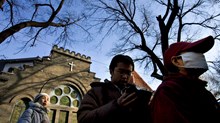A Korean American church in Chicago's suburbs is suing a primarily white congregation for rejecting its bid to purchase the congregation's property. The suit alleges the decision was based on racial grounds, a violation of Illinois' Human Rights Act.
According to the lawsuit, which was filed on September 18, Antioch Korean Covenant Church offered to pay $1 million to purchase Prospect Heights Community Church's building. The bid was rejected in favor of a $500,000 offer from Cornerstone Bible Church. Both Cornerstone and Antioch had rented space on the property before it went up for sale.
Prospect Heights Community Church officials did not respond to requests for comment. However, in a motion to dismiss the suit, the church's lawyer wrote that Antioch's offer letter was so unspecific as to "not constitute an offer under contract law."
Officials at the Prospect Heights church, which had experiencing a dwindling membership and financial difficulties, began discussing the sale of their building after unsuccessfully seeking to merge with other churches, including Cornerstone Bible Church. Members of the Prospect Heights church, a United Church of Christ congregation, had voted against the merger with Cornerstone, citing theological differences and the absence of a monetary offer.
"We've been trying three months to negotiate; however, they don't think it's racial (discrimination)," said the Rev. Seng Kim, Antioch's pastor, as translated by his daughter, Hanae. When asked about Paul's prohibition against suing fellow Christians in 1 Corinthians 6, Kim said, "We really tried hard. We tried to treat them as brothers in Christ, and they did not want it."
Although a religious institution can discriminate on the basis of religion, it cannot do so on the basis of race, national origin, or other federally protected classes. Carl Esbeck, a law professor at the University of Missouri, reviewed the 11-page complaint for CT.
"My general reaction is there are no church-state or religious freedom issues here," Esbeck said. "If this is purely [a case of] national origin discrimination, the court has jurisdiction."
Copyright © 2008 Christianity Today. Click for reprint information.
Related Elsewhere:
The Daily Herald also reported on the story.

Support Our Work
Subscribe to CT for less than $4.25/month

















